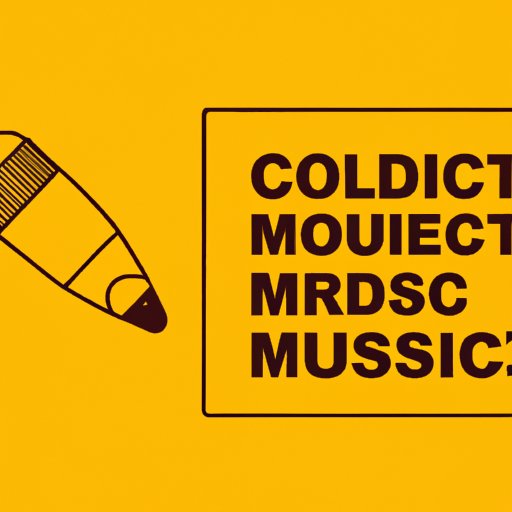I. Introduction
The music publishing industry can be a challenging landscape for musicians trying to get their music heard. With so many different avenues to explore, from self-publishing to finding the right music publisher, it can be overwhelming for musicians to know where to start. This article aims to provide a comprehensive guide to publishing your music, covering everything from copyright law and distribution to common mistakes to avoid and how to find a music publisher.
II. The Ultimate Guide to Publishing Your Music
Registering your music: Before you can release your music to the world, you need to make sure that it’s properly registered. Depending on where you live, this can mean registering with a performance rights organization (PRO), such as BMI or ASCAP, or with your national copyright office. These registrations will allow you to collect royalties for your music, which we’ll discuss more in the next section.
Copyright law and how it protects your music: Your music is your intellectual property, and as such, it needs to be protected. Copyright law protects your music from being stolen or used without your permission, and it also allows you to collect royalties from the use of your music. When you register your music with a PRO or your national copyright office, you are ensuring that your music is protected and that you can collect the royalties you deserve.
Collecting royalties: As we mentioned earlier, registering your music allows you to collect royalties from the use of your music. These royalties can come from a variety of sources, including radio play, live performances, and streaming services. PROs are responsible for tracking and collecting these royalties, and they will pay them out to you on a regular basis.
Using distribution companies: Once your music is registered and protected, you can start to think about how you want to release it. There are a variety of distribution companies out there that can help you get your music on streaming services like Spotify and Apple Music, including TuneCore and DistroKid. These services will take a percentage of your royalties in exchange for handling the distribution of your music.
Artwork and graphics design for your album: While it may not seem like the most important aspect of publishing your music, having great artwork and graphics design can really make your music stand out. If you’re not comfortable designing your own album art, consider hiring a graphic designer to help you create something that really captures the essence of your music.
III. DIY Music Publishing: How to Get Your Music Heard without a Record Label
Self-releasing: Thanks to the internet, it’s easier than ever to release your own music without the help of a record label. You can use platforms like Bandcamp and Soundcloud to release your music directly to your audience, and you can use services like PayPal and Patreon to collect payments from your fans.
Self-promotion: While self-releasing gives you the freedom to release your music on your own terms, it also means you’re responsible for promoting it. Make sure you have a strong social media presence and consider running targeted ads to reach new fans.
Social media marketing: Social media is a powerful tool for musicians, allowing you to connect with fans all over the world. Make sure you’re using platforms like Facebook, Instagram, and Twitter to promote your music and engage with your audience.
How to build a DIY website: Having your own website can be a great way to promote your music and sell merchandise. Platforms like Wix and Squarespace make it easy for anyone to build their own website, even if you have no coding experience.
IV. Navigating the Complex World of Music Publishing Contracts
Overview of different types of contracts in music publishing: There are a variety of different contracts involved in music publishing, each with its own unique terms and conditions. Some of the most common types of contracts include sync licensing, mechanical licensing, and performance royalties.
Synchronization licensing: Sync licensing refers to the use of music in film, TV, and other media. If you want your music to be featured in a movie or on a TV show, you’ll need to negotiate a sync licensing contract.
Mechanical licensing: Mechanical licensing refers to the use of music in the creation of physical copies, such as CDs and vinyl records. If you’re planning on releasing physical copies of your music, you’ll need to obtain a mechanical license.
Performance royalties: Performance royalties are collected any time your music is played in public, whether it’s on the radio, in a live venue, or on streaming services like Spotify. PROs are responsible for collecting these royalties and paying them out to the appropriate artists.
What are the terms and conditions involved in this contract: Each type of contract will have its own unique terms and conditions, so it’s important to read through everything carefully before signing on the dotted line. If you’re not comfortable with something in the contract, don’t be afraid to negotiate or walk away.
V. 5 Common Mistakes to Avoid When Publishing Your Music
Understanding copyright laws: As we mentioned earlier, copyright law is incredibly important when it comes to publishing your music. Make sure you’re familiar with the basics of copyright law and register your music with the appropriate organizations.
Not submitting quality music: Your music is your brand, so make sure it’s the best it can be before you release it. Take the time to record and produce high-quality tracks that really showcase your talent.
Choosing the right distribution companies: While there are a lot of distribution companies out there, not all of them are created equal. Do your research and choose a company that has a good reputation and can provide you with the services you need.
Not having a right business plan: As with any business, it’s important to have a solid plan in place before you start publishing your music. You should have a clear idea of your goals, your target audience, and your marketing strategy.
Not reviewing the terms and conditions: We can’t stress this enough – make sure you read everything carefully before signing on the dotted line. Music contracts can be complicated, so don’t be afraid to ask for help if you need it.

VI. From Garage Band to Global Release: A Guide to Publishing Your Music Online
Digital distribution platforms: In addition to using distribution companies, there are a variety of digital distribution platforms that can help you get your music on streaming services. Some of the most popular platforms include CD Baby, TuneCore, and DistroKid.
TuneCore: TuneCore is a popular digital distribution service that allows you to distribute your music to a wide range of platforms, including Spotify, Apple Music, and Tidal. They charge a flat fee per release and take no commission from your sales.
DistroKid: DistroKid is another popular digital distribution service that charges an annual fee instead of a per-release fee. They also take no commission from your sales and allow you to keep 100% of your royalties.
What are the terms and conditions for these services: Before signing up for any digital distribution service, make sure you read through the terms and conditions carefully. Make sure you’re comfortable with the percentage of royalties they take and any other fees they charge.
VII. Behind the Scenes: The Role of a Music Publisher and How to Find the Right One for You
What is the role of a music publisher: Music publishers are responsible for promoting and licensing your music, collecting your royalties, and handling any legal issues that may arise. They can also help you connect with other artists and industry professionals.
How a music publisher can help your career: While it’s possible to publish your own music without the help of a publisher, having one on your side can really help take your career to the next level. They have connections and knowledge that you may not have access to on your own.
How to find a music publisher: There are a variety of ways to find a music publisher, including attending industry events, asking for referrals from other musicians, and searching online directories.
What to look for when it comes to selecting your music publisher: When selecting a music publisher, make sure you choose someone who has experience in your genre and a track record of success. You should also look for someone who is easy to communicate with and who shares your vision for your music.
VIII. Conclusion
As you can see, the world of music publishing can be both complex and exciting. Whether you’re interested in DIY publishing or finding the right music publisher, there are a variety of options available to you. To recap, we’ve covered everything from copyright law and distribution to common mistakes to avoid and how to find a music publisher. Our final tips for musicians trying to publish their music are to be persistent, be patient, and be willing to learn.
At the end of the day, the music publishing industry is constantly evolving. Stay flexible, stay informed, and don’t be afraid to take risks and try new things.
(Note: Is this article not meeting your expectations? Do you have knowledge or insights to share? Unlock new opportunities and expand your reach by joining our authors team. Click Registration to join us and share your expertise with our readers.)
